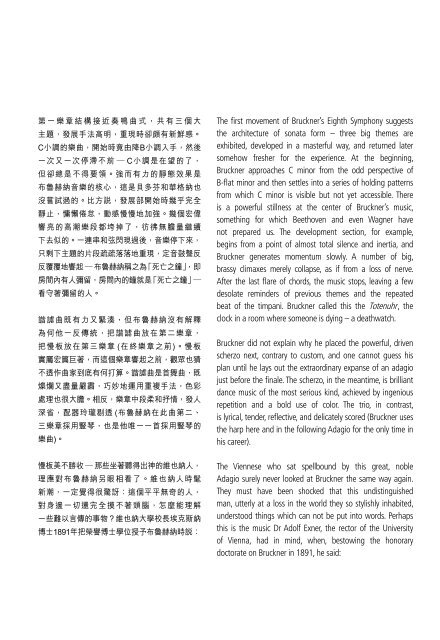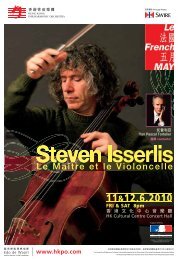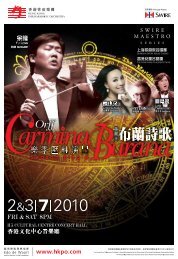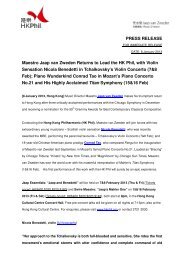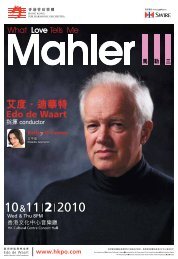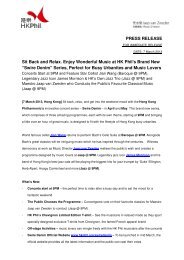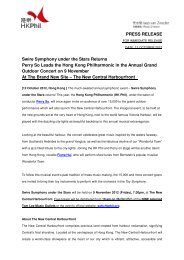here - Hong Kong Philharmonic Orchestra
here - Hong Kong Philharmonic Orchestra
here - Hong Kong Philharmonic Orchestra
You also want an ePaper? Increase the reach of your titles
YUMPU automatically turns print PDFs into web optimized ePapers that Google loves.
The first movement of Bruckner’s Eighth Symphony suggests<br />
the architecture of sonata form – three big themes are<br />
exhibited, developed in a masterful way, and returned later<br />
somehow fresher for the experience. At the beginning,<br />
Bruckner approaches C minor from the odd perspective of<br />
B-flat minor and then settles into a series of holding patterns<br />
from which C minor is visible but not yet accessible. T<strong>here</strong><br />
is a powerful stillness at the center of Bruckner’s music,<br />
something for which Beethoven and even Wagner have<br />
not prepared us. The development section, for example,<br />
begins from a point of almost total silence and inertia, and<br />
Bruckner generates momentum slowly. A number of big,<br />
brassy climaxes merely collapse, as if from a loss of nerve.<br />
After the last flare of chords, the music stops, leaving a few<br />
desolate reminders of previous themes and the repeated<br />
beat of the timpani. Bruckner called this the Totenuhr, the<br />
clock in a room w<strong>here</strong> someone is dying – a deathwatch.<br />
Bruckner did not explain why he placed the powerful, driven<br />
scherzo next, contrary to custom, and one cannot guess his<br />
plan until he lays out the extraordinary expanse of an adagio<br />
just before the finale. The scherzo, in the meantime, is brilliant<br />
dance music of the most serious kind, achieved by ingenious<br />
repetition and a bold use of color. The trio, in contrast,<br />
is lyrical, tender, reflective, and delicately scored (Bruckner uses<br />
the harp <strong>here</strong> and in the following Adagio for the only time in<br />
his career).<br />
The Viennese who sat spellbound by this great, noble<br />
Adagio surely never looked at Bruckner the same way again.<br />
They must have been shocked that this undistinguished<br />
man, utterly at a loss in the world they so stylishly inhabited,<br />
understood things which can not be put into words. Perhaps<br />
this is the music Dr Adolf Exner, the rector of the University<br />
of Vienna, had in mind, when, bestowing the honorary<br />
doctorate on Bruckner in 1891, he said:


